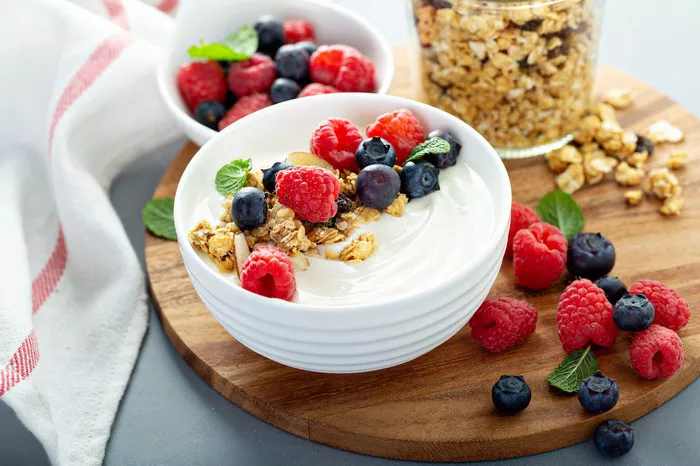Yogurt is a popular and versatile dairy product that can be a valuable addition to a weight loss diet. Packed with essential nutrients, including protein, calcium, and probiotics, yogurt offers a range of benefits for those seeking to shed extra pounds. In this article, we will delve into the world of yogurt and explore which types and varieties are best suited for effective weight management.
Understanding Yogurt’s Role in Weight Loss
Yogurt can be a valuable component of a weight loss diet due to its nutrient profile and potential benefits for appetite control, digestion, and overall metabolic health. However, it’s important to note that weight loss ultimately depends on creating a calorie deficit through a combination of diet and physical activity.
Protein-Packed Yogurt
Protein is an essential nutrient that plays a crucial role in weight loss and weight management. It helps promote satiety, increase calorie burning during digestion, and support muscle growth and maintenance. When selecting yogurt for weight loss, opt for options that are high in protein and low in added sugars.
Greek Yogurt
Greek yogurt is a popular choice for weight loss due to its high protein content. It is made by straining regular yogurt to remove the liquid whey, resulting in a thicker and creamier texture. Greek yogurt contains about twice the amount of protein as regular yogurt, making it a satisfying and filling option.
The high protein content of Greek yogurt can help curb cravings, reduce appetite, and promote feelings of fullness, potentially leading to a lower calorie intake throughout the day. Including Greek yogurt as part of a balanced meal or snack can contribute to a well-rounded and weight-conscious diet.
Plain Yogurt with Minimal Additives
When selecting yogurt for weight loss, opt for plain varieties with minimal additives and sweeteners. Flavored yogurts often contain added sugars, artificial sweeteners, and high-calorie flavorings, which can hinder weight loss efforts. By choosing plain yogurt, you have more control over the ingredients and can avoid unnecessary sugars and calories.
Low-Fat and Non-Fat Options
Low-fat and non-fat yogurts can be beneficial for weight loss due to their reduced calorie and fat content. However, it’s important to pay attention to the ingredient list and avoid yogurts that compensate for the lower fat content by adding excessive sugars or artificial additives. Read the labels and choose options that prioritize protein and have limited added sugars.
Naturally Sweetened Yogurts
If you prefer a hint of sweetness in your yogurt, consider naturally sweetened options. Some brands use natural sweeteners like stevia, monk fruit extract, or fruit purees to enhance the flavor without adding excessive sugars. These yogurts provide a balanced taste while keeping calorie and sugar content in check.
Yogurt with Probiotics
Probiotics are beneficial bacteria that promote a healthy gut microbiome, which is essential for digestion, immune function, and overall well-being. Certain strains of probiotics have been linked to weight management benefits, including improved metabolism and reduced belly fat.
To enjoy the potential benefits of probiotics, look for yogurt labeled as containing live and active cultures or specific strains of probiotics such as Lactobacillus acidophilus or Bifidobacterium lactis. These strains are known for their potential role in supporting gut health and weight management.
Homemade Yogurt
If you’re adventurous and enjoy cooking, making your own yogurt at home can be a rewarding and healthy option. Homemade yogurt allows you to control the ingredients and the fermentation process, ensuring that you’re getting a product with minimal additives and maximum nutritional value. You can use whole milk, low-fat milk, or plant-based milk as a base and experiment with different types of cultures and flavors.
Pairing Yogurt with Healthy Toppings
To further enhance the nutritional value and taste of your yogurt while keeping it weight-conscious, consider adding healthy and flavorful toppings. Here are some ideas:
Fresh Fruit: Add slices of fresh fruit, such as berries, banana, or diced apple, to boost the fiber and antioxidant content of your yogurt.
Nuts and Seeds: Sprinkle a handful of chopped nuts or seeds like almonds, walnuts, chia seeds, or flaxseeds for added texture, healthy fats, and additional nutrients.
Cinnamon or Vanilla: Sprinkle a dash of cinnamon or a drop of vanilla extract for a burst of flavor without adding extra calories.
Unsweetened Granola: Top your yogurt with a small amount of unsweetened granola for crunch and added fiber. Be mindful of portion sizes to avoid excessive calorie intake.
Incorporating Yogurt into a Balanced Diet
While yogurt can be a valuable addition to a weight loss diet, it’s important to remember that overall dietary balance and portion control are key. Here are a few tips for incorporating yogurt effectively into your weight management plan:
Moderation: Enjoy yogurt in moderation as part of a balanced meal or snack. Be mindful of portion sizes and avoid excessive calorie intake.
Meal Replacement: Yogurt can serve as a convenient and nutritious meal replacement option, particularly when combined with fruits, nuts, and seeds.
Pre- and Post-Workout Snack: Yogurt can be a satisfying pre- or post-workout snack due to its protein content. Consider adding a small amount of carbohydrates, such as fruit or whole-grain cereal, to provide additional energy.
Variety: Experiment with different types of yogurts, flavors, and toppings to keep your meals interesting and prevent taste fatigue.
Dietary Considerations: If you have specific dietary restrictions or follow a plant-based diet, explore dairy-free alternatives like almond, soy, or coconut milk-based yogurts. Ensure they contain adequate protein and minimal added sugars.
Conclusion
Yogurt can be a valuable component of a weight loss diet due to its high protein content, satiety-promoting properties, and potential benefits for gut health. When selecting yogurt for weight loss, choose plain, low-fat or non-fat varieties with minimal added sugars and artificial additives. Greek yogurt and yogurts with natural sweeteners or probiotics can also be beneficial choices.
Remember to enjoy yogurt as part of a well-rounded diet that includes a variety of nutrient-dense foods, regular physical activity, and a calorie deficit to achieve weight loss goals. By incorporating yogurt strategically into your diet, you can savor its creamy goodness while supporting your weight management efforts.
























